Cat On a Hot Tin Roof
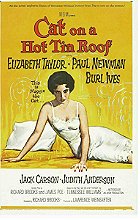 Posted : 15 years, 3 months ago on 10 March 2010 07:08
(A review of Cat on a Hot Tin Roof)
Posted : 15 years, 3 months ago on 10 March 2010 07:08
(A review of Cat on a Hot Tin Roof)Cat On a Hot Tin Roof tells the story of Brick Pollard, a man trapped by past glories, memories and his own complicated sexuality, his wife Maggie, a devoted wife who’s overheated sexuality causes some of the tension in the family at large. They have returned to his familial home for Big Daddy’s birthday, played to roaring and commanding perfection by Burl Ives, who is slowly succumbing to cancer. Brick’s brother is after the family fortune, but Big Daddy favors the troubled Brick and Maggie. The film only rarely leaves the house, and those are all in the opening sequences. We are treated to a claustrophobic Southern Gothic drama. It sounds stuffy and stage-y, but it’s a treat to watch thanks to the committed performances.
This was Paul Newman’s big break. He had made films before, but this role and his performance allowed him to transcend pretty boy roles. His talent as an actor was to always appear effortless. He never seemed to be doing the heavy lifting. Newman always seemed to actually be these characters, and he excelled at playing drunks without resorting to clichés and silly mugging.
Much has been made of the toned down possible homosexuality in his character, but to me that element is obviously there. There is an extended sequence late in the film where Newman and Ives have a discussion about Brick’s hero worship for his dead best friend. Much is said, but much more is said in what is skirted around and never directly addressed. Yes, it is toned down, but that works to the film’s benefit. Family members often speak in coded language to one another about large issues that are plaguing the unit. And it truly doesn't take much work to unpack the guarded language and word choices to grasp at what's not being spoken of directly.
And what can be said of Elizabeth Taylor that hasn’t already been stated a million times before? She was a great beauty, possessed with violet eyes that flirted with darkness around the edges and such fair skin and black hair that she almost looked like Snow White come to life. But she was also a fantastic actress. Her emotional connection to this part speaks volumes about why her legend continues to endure. And she deservedly got an Academy Award nomination. As did Newman, his first and Taylor’s second.
Cat On a Hot Tin Roof is not a perfect film, it never quite overcomes the stage-bound origins of the material, but it features two of the greatest screen legends giving some career highlight performances. There is much to discover, discuss and be moved by. This is a rewarding film that only deepens the more you watch it. It’s one of my favorites.
 0 comments, Reply to this entry
0 comments, Reply to this entry
The Best of Darlene Love
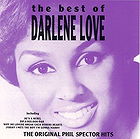 Posted : 15 years, 3 months ago on 10 March 2010 07:07
(A review of The Best of Darlene Love)
Posted : 15 years, 3 months ago on 10 March 2010 07:07
(A review of The Best of Darlene Love)Darlene Love was blessed with a voice that could be tremendously powerful (“A Fine, Fine Boy”) and very emotional (“Lord, If You’re a Woman”). These teenage-aimed pop songs are surprisingly durable. They sound just as inventive and infectious as they did when they debuted in the early to mid 60s. Love was one of many vocalists that super-producer Phil Spector loved to use again and again and again. It is little wonder why given how beautiful and feisty of a vocalist she is. She is one of my favorite musical artists of all time. I want everyone to hunt down this collection and hear why. Yes, lyrically these songs of teenage love and affection might be a little dated, but a great voice and great music is timeless. DOWNLOAD: “A Fine, Fine Boy,” “He’s a Rebel,” “He’s Sure the Boy I Love”
 0 comments, Reply to this entry
0 comments, Reply to this entry
The Kink Kronikles
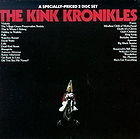 Posted : 15 years, 3 months ago on 4 March 2010 08:36
(A review of The Kink Kronikles)
Posted : 15 years, 3 months ago on 4 March 2010 08:36
(A review of The Kink Kronikles)The Kink Kronikles is packed to the brim with B-sides, album-only tracks and rarities that rank just as highly as their earliest skuzzy garage-punk assaults like “All Day and All of the Night” or “Stop Your Sobbing.” The gender-bending mind-fuck of “Lola” sounds like a rollicking adolescent male discussing his first blush of sexual excitement, then you pay closer attention to the lyrics and you realize Lola may not be as womanly as our narrator thinks.
That same brand of vicious wit and acerbic bite take effect on the high-energy “David Watts.” But it’s when the Kinks slow things down that I get the most out of this album. “Waterloo Sunset” is their crowning glory. It’s a gorgeous song in every since of the word. “You Really Got Me” might be the most famous, but “Waterloo Sunset” has the most to offer on every artistic, musical and emotional level. And those are just three of the twenty-eight songs included.
Ray Davies, the cocky raunch king of dark come-ons and possibly seedy sex, matures and strengthens as a storytelling song writer. There’s less of a cocksure strut and more concept album ideas being thrown around. “Victoria” and “Village Green Preservation Society” deal with Victorian ideals and imagine a world that’s permanently gray, in only the way that London could be. Slightly baroque, highly pastoral, that would be the best description for this period. And I love every note encased in this eighty-eight minute two-disc set.
This is the best kind of compilation album, a perfect introductory point for the uninitiated and an absolutely necessary addition to the collection for the already initiated. They might have started life as another clan of mop-topped British invaders, but they wound up being hugely influential in their own right. They’re the step-dads of punk, the earliest of hard rockers and an almost folk-ish group of British romantics with far too many realist notions to fully commit. DOWNLOAD: “Waterloo Sunset,” “Lola,” “She’s Got Everything,” “David Watts”
 0 comments, Reply to this entry
0 comments, Reply to this entry
#1
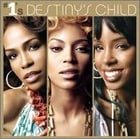 Posted : 15 years, 3 months ago on 4 March 2010 08:34
(A review of #1's)
Posted : 15 years, 3 months ago on 4 March 2010 08:34
(A review of #1's)#1’s is a hilariously ego-centric misnomer for Destiny’s Child’s greatest hits package. If they hadn’t already used the name for their previous album, Destiny Fulfilled would have been miles better. Or, even, just naming it Greatest Hits or The Best of. What we get are their four number one singles from the Hot 100, some that never charted that high, some new songs and lots of Beyoncé counting down the minutes until her eventual solo career breakout. (This [Link removed - login to see] grew ever more relevant with each new single.)
Destiny’s Child also suffers from a distinct case of split-personality. They’re either empowered, independent women putting scrubs in their place, or they’re codependent to questionable men and demonstrating some unrealistic expectations and silly ideas. Which is it? And, while I find “Girl” to be a handful of clichés that grind against the nerves, at least there’s some sort of female bonding going on.
They’re much more believable telling the guys to kick it to the curb or not to disrespect their brickhouse. “Bootylicious” features a sample from Stevie Nicks and an attitude that encourages people to embrace their curves and celebrate their inner-confidence. “Lose My Breath” is the sickest cheerleading chant posing as a song, and their zenith as far as singles go. While “Say My Name” should be added to the lexicon of teenage girl power anthems.
It’s just a pity that the other girls were rarely, if ever, given a chance to showcase their impressive pipes. Kelly Rowland knows how to build a song, which “Feel the Same Way I Do” demonstrates time and time again until Beyoncé comes in. Any momentum that Kelly had built is automatically killed as Beyoncé over-sings like she’s trying to remind Kelly who the boss is. Yes, she is blessed with an impressive voice. Yes, she can sing. Yes, she can do a great vocal run, but she can’t restrain herself long enough to build a song.
The total obliteration that happens to “Emotion” is nearly unforgivable. At least Michelle Williams and Kelly knew when to rein it in and just deliver a solid vocal. Not every ballad needs to be vocal run showcase. The less said about the unbelievably awful “Stand Up for Love” the better, I don’t care how well intentioned it was. By the time of her solo career’s one-two punch of Beyoncé and Lemonade she learned when less was in fact more.
So, since they’ve broken up for all intents and purposes, the obvious question comes to mind during this set: are Destiny’s Child destined for girl-group greatness the way that TLC, for insance, were? I’m not entirely sure. They never made a great album from front to back like TLC did, and they won two Best R&B Album Grammys. Destiny’s Child had great singles, but great singles and lackluster albums worked for groups like the Shirelles and Diana Ross & the Supremes because they were engineered as singles artists.
Are they one of the greatest? I don’t know. This makes an argument for it, I’m just not sure if they’ll go down as one of the greatest. They were a lot of fun for a brief period of time. But in hindsight, they just seem like a group that was clearing space for Beyoncé’s eventual pop cultural takeover.
DOWNLOAD: “Lose My Breath,” “Say My Name,” “Independent Women”
 0 comments, Reply to this entry
0 comments, Reply to this entry
The People vs Larry Flynt
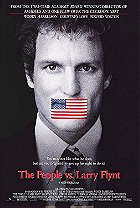 Posted : 15 years, 3 months ago on 4 March 2010 08:31
(A review of The People vs. Larry Flynt (1996))
Posted : 15 years, 3 months ago on 4 March 2010 08:31
(A review of The People vs. Larry Flynt (1996))There is a brief glimpse into his childhood, but that serves more as a scene to explain his work ethic and commitment to his ideals. That, and he’s always been a purveyor of filth of some kind. In that scene, moonshine, in the rest of the film it’s pornography. And it makes no attempt to classy it up like Playboy. Hustler is pure filth. Smut of the highest order, complete with questionable parodies and cartoons. This is not about how he went from rags to riches by providing a service to horny truck drivers, this is how he used his smut peddling to uphold the Constitution.
As played by Woody Harrelson, Flynt is slightly charming, even damaged, but prone to childish antics, temper tantrums and bouts of sheer unlikability. His performance is a tour de force, he never impersonates Flynt, although he does get the cadence and timber of his voice after getting shot, but instead creates a hellish wild child. He fluctuates between comedic blustering and dramatic pathos with equal ease. This performance anchors the film and allows for us to see that, just maybe, the man who created Hustler is a real genius in the business world. Harrelson is given great support from Edward Norton as his lawyer, James Cromwell as a seedy politician hiding behind a mask of righteousness and Courtney Love as his doomed, wild child wife.
But how is Flynt a patriot? He unflinchingly withheld his belief that the Constitution protected his right to produce the tasteless, morally questionable and absolutely grotesque images, articles and opinions that Hustler trades its stock in. If the Constitution could protect him, as he believed and proved that it would and could, it would do the same for the likes of us normal folks. He proved something about American politics that few politicians would even dare to tread. Is he a purveyor of bad taste? Oh, yes, unquestionably. Has he provided a great service to his country? Oh, yes, unquestionably. He just didn’t do it in a way that anyone saw coming.
I feel like this movie is too little seen, too often misunderstood. There is no glorification of pornography, there is nothing that states what he does is fine, well and good. The film challenges his right to say and do it. It only makes the argument that our Freedom of Speech is there to protect ALL speech, especially that which we hate.
 0 comments, Reply to this entry
0 comments, Reply to this entry
The Snake Pit
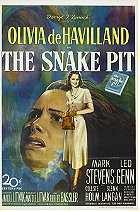 Posted : 15 years, 4 months ago on 23 February 2010 07:38
(A review of The Snake Pit)
Posted : 15 years, 4 months ago on 23 February 2010 07:38
(A review of The Snake Pit)Olivia de Havilland, so sweet and so good on the outside, portrays a woman who feels her sanity slowly slipping away from her. She is institutionalized after marrying a man and displaying erratic behavior. She is truly sick? Why, yes, she is. She has lived through a tremendous trauma, I will not spoil it for you, and has since begun the slow process of mentally shattering. There are also hints at some kind of Freudian psychology and a history of mental unease. But not even de Havilland’s fierce performance – so believable and heartbreaking because she so often plays the good, moral and noble character – can save the film from the treatment that she is given. To put it simply, if she stops marching to her own drum and becomes the good, subservient wife and mother that everyone wants her to be she’ll be happy and sane. Then how do you explain the extended sequences of obvious schizophrenia, electroshock therapy and hydrotherapy? If she gets a husband and a child she’ll chemically hit her own reset button? They meant well, I think.
 0 comments, Reply to this entry
0 comments, Reply to this entry
8 ½
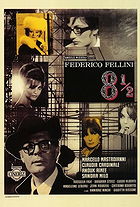 Posted : 15 years, 4 months ago on 23 February 2010 07:37
(A review of 8½ (1963))
Posted : 15 years, 4 months ago on 23 February 2010 07:37
(A review of 8½ (1963))8 ½ tells the story of Guido (Marcello Mastroianni), an Italian director during the height of Neo-Realist cinema. He feels creatively blocked, and continuously escapes into his memories and boundless imagination. Cracking under the pressures of being the most well-known Neo-Realist director, he escapes to a spa and brings with him his longtime mistress. It’s a pity that he won’t be able to actually escape, since the studio, producers, designers, etc. have followed him there.
Federico Fellini was obviously working out his own issues on the screen. And if any of this sounds relatively familiar, the musical Nine was based off of this. But it was tremendously inferior to this film. This is yet another case of the original being superior to the remake, no matter if the remake was gussied up as a lavish musical.
Marcello Mastroianni, with his aged good looks and charmingly roguish air, is as perfect as always. I wonder how much of his performance was based upon Fellini and how much was his own creation. He worked with Fellini enough times to gain a good enough grasp to do an imitation, and repeating leading actors are often considered to be attractive variations of their directors. For instance, what are Johnny Depp’s lovable odd-balls creations if not variations on Tim Burton’s own psyche and quirky personality? Regardless, it is a wonderful performance that anchors the film in some semblance of reality, but has just enough hints and giggles bubbling underneath to work with the whimsy.
And let us discuss the whimsy! I love the incredibly fine, infinitely porous line between reality, fantasy and memory. I found no trouble in deciphering which was which, and I don’t believe that I would have minded getting lost amongst them, anyway. The imagined scene where his mistress and his wife meet-up and greet each other with open arms, kisses and anecdotes slowly turns into a scene where he lives in a house filled with women he has loved, wanted to love and have loved him. This is not a man who is fulfilled and caressed by these memories and imaginings, he seems more possessed. Like these feverish daydreams are slowly driving him closer to a nervous breakdown, weighing upon his soul and emotionally constipating them. It’s all in how Marcello furrows around the eyes and mouth.
I can understand that 8 ½ will not be to everyone’s liking, it requires a strict attention span, a tolerance for whimsy, an urge not for a narrative but for an experience. I do love a good narrative, but I also love a good experience. A great piece of art works on many levels, and so this does. There is a narrative, however thin but solidly told, but there is also a great and joyous experience to be had. What can I say? I was charmed by this man filled with lust and Catholic guilt.
 0 comments, Reply to this entry
0 comments, Reply to this entry
Guess Who's Coming to Dinner
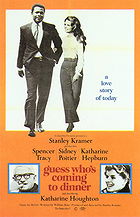 Posted : 15 years, 4 months ago on 17 February 2010 05:17
(A review of Guess Who's Coming to Dinner)
Posted : 15 years, 4 months ago on 17 February 2010 05:17
(A review of Guess Who's Coming to Dinner)The story deals with the affluent white daughter bringing home the man she found herself in a whirlwind romance with, a successful, dignified and highly intelligent older man. A man who just so happens to be black and this will bring up ever complicated and contradictory emotion that each of their parents has about the issue. Both have a mother who supports the union and both have a father who doesn’t support or understand their choice of partner. I would have preferred for some difference between the races. We get numerous scenes of Hepburn talking to Tracy about the lessons they have imparted on their daughter, she constantly reminds him that he taught her to think racism as horrendously idiotic and vile thing. Wouldn’t it have been more interesting of her mother, or both of her parents, had had more reservations about the union. Or even brought up subtly hidden racism, and with a black housemaid who’s worked for them for decades, it seems like there just might be. It is not the fault of any of the actors, this is a fault with the writing which seeks too much literary symmetry when asymmetry or even a lack of symmetry would have proven more intriguing.
The film also touches, however slightly, on interior racism. With the black housemaid raising all sorts of accusations and condemnations, all of which are unfounded, against Poitier. He takes each of her verbal lashings, she is from an older generation and believes that things shouldn’t be rocked and forced as much as they are. He is from the newer generation who seeks equality, not because of his history or his race, but because he is a hardworking individual who deserves to be treated equally. This dynamic extends outwards towards his relationship with his father in which he explains that his father thinks of himself as a black man, and he thinks of himself as a man. And that is all the difference in the world. The way that Sidney Poitier plays these two crucial scenes is the kind of subtle and meticulous acting that the Oscars were invented to celebrate, nominate and honor.
Katharine Hepburn won the Academy Award for this performance, but I cannot say that it screams out as a winning performance. She is as intelligent, luminous and graceful as ever. She delivers a great performance, but I wouldn’t rank it above Anne Bancroft or Faye Dunaway’s sublime and iconic turns as Mrs. Robinson and Bonnie Parker. Spencer Tracy is as solid and morally right as ever. He excelled in portraying men who have a specific moral compass, get it tested, question their beliefs and come out as the authoritative voice on the issue (see Judgment at Nuremberg). Katharine Houghton, Hepburn’s niece and younger look-alike, isn’t bad, she’s quite good. But she’s out of her acting league working opposite such towering screen icons. Cecil Kellaway and Beah Richards deliver my two favorite supporting performances as a family-friend who just so happens to be a priest and Poitier’s mother, respectively. They were both Oscar nominated.
While nowhere near a bad film, I wouldn’t rank it as a masterpiece. It’s very good, but slightly flawed. It deserves respect for treating such a sensitive and fresh subject, interracial marriage was just about to be made legal in all the states, with maturity, intelligence and warmth. It preaches too easily, and makes easy answers where complicated ones would have really been better suited for the material, but it tries its best. From here you can see the 1970s revolution of cinema creeping in around the edges. This is where the studio system and the independent, artistic streak merge.
 0 comments, Reply to this entry
0 comments, Reply to this entry
Respect M.E.
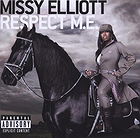 Posted : 15 years, 4 months ago on 17 February 2010 05:16
(A review of Respect M.E.)
Posted : 15 years, 4 months ago on 17 February 2010 05:16
(A review of Respect M.E.)Respect M.E. is a perfect summarization of the past decade and perfect introductory point for the unconverted. It’s a non-chronological spin through songs like “The Rain (Supa Dupa Fly),” “4 My People” and “She’s a Bitch.” I’m normally a stickler for chronological sequencing, but it works here. Missy Elliott isn’t an artist who grew in artistic stature, she came out swinging, but just got weirder and wilder as she along. She picked up where MC Lyte, Queen Latifah and Salt-N-Pepa left off: she was an empowered woman who wasn’t afraid of reversing the inherent sexism of hip-hop, just having a good time and celebrating old school charms. She did it with intelligence, humor and style and nothing else sounded like her singles on the radio when they came out.
And let us discuss those singles, or, at least, a chosen few of my favorites. “Pass That Dutch” is a pressure-cooker ready to blow. It lacks a traditional structure, but it’s a wild party from another planet being beamed into your speakers. “Work It” features layers of samples, a charmingly old school beat and backward lyrics. Her introduction includes a boastful “Missy Elliott exclusive” which isn’t really boasting since this delivers what she’s talking about. “I’m Really Hot” lets everyone in the game know that no matter what you think, Missy is still the wildest and most creative person out there right now. And “She’s a Bitch” lets everyone know that no one is going to call her a bitch, unless it’s on her own terms. Nothing, however, has topped the wildness, creativity or influence of “Get Ur Freak On.” Before this how many hip-hop producers were creating such electronic influenced music? Or sampling such random Eastern beats? With that one song Missy Elliott launched herself into the pop music elite. With each new single she created another impressive and perfect moment, but nothing will top that masterpiece.
I would have preferred for “4 My People” to have been included in its original form and not the Basement Jaxx remix, but that was the hit version. So I understand why it was included. I also would have liked to have had “Take Away,” “Lick Shots,” “Funky Fresh Dressed” or “Back in the Day.” These aren’t deal breakers, but they would have been great inclusions. Her humor, imagination, numerous talents as singer-rapper/writer/producer, self-empowerment and positivity prove only one thing about Missy Elliott: she’s an icon in the making. DOWNLOAD: “Get Ur Freak On,” “Pass That Dutch,” “She’s a Bitch”
 0 comments, Reply to this entry
0 comments, Reply to this entry
Night Ride Home
 Posted : 15 years, 4 months ago on 17 February 2010 05:15
(A review of Night Ride Home)
Posted : 15 years, 4 months ago on 17 February 2010 05:15
(A review of Night Ride Home)“Come In from the Cold” is an exquisite song about childhood and middle-age. The introspective lyrics, silky vocal delivery and strange harmonics recall Hejira, her last good album before this. The jazzy introduction to “The Only Joy in Town” recalls the sounds of Hejira even more so, there’s something slightly Arabic about the way the horns slink. But nothing can top “Slouching Towards Bethlehem,” Mitchell has taken W. B. Yeats poem and set it to music. Patti Smith did something similar with “Spell” on Peace & Noise, which just makes me even more convinced that Joni Mitchell and Patti Smith both decided to take folk music and distort it to their own passions.
While Night Ride Home is a very good album, there’s something preventing it from being as great as anything between Ladies of the Canyon and The Hissing of Summer Lawns. It’s about as good as, you guessed it, Hejira. Which isn’t a slight, for that is also a rich, deeply rewarding effort that is quite often highly difficult to listen to because Mitchell has chosen to follow her artistic muse so far out into uncharted territory that we’re just not familiar with it. But that is why she is an icon, an influence upon generations of women (and men) and not some flash-in-the-pan pop tart. DOWNLOAD: “Slouching Towards Bethlehem”
 0 comments, Reply to this entry
0 comments, Reply to this entry
 Login
Login
 Home
Home 95 Lists
95 Lists 1531 Reviews
1531 Reviews Collections
Collections